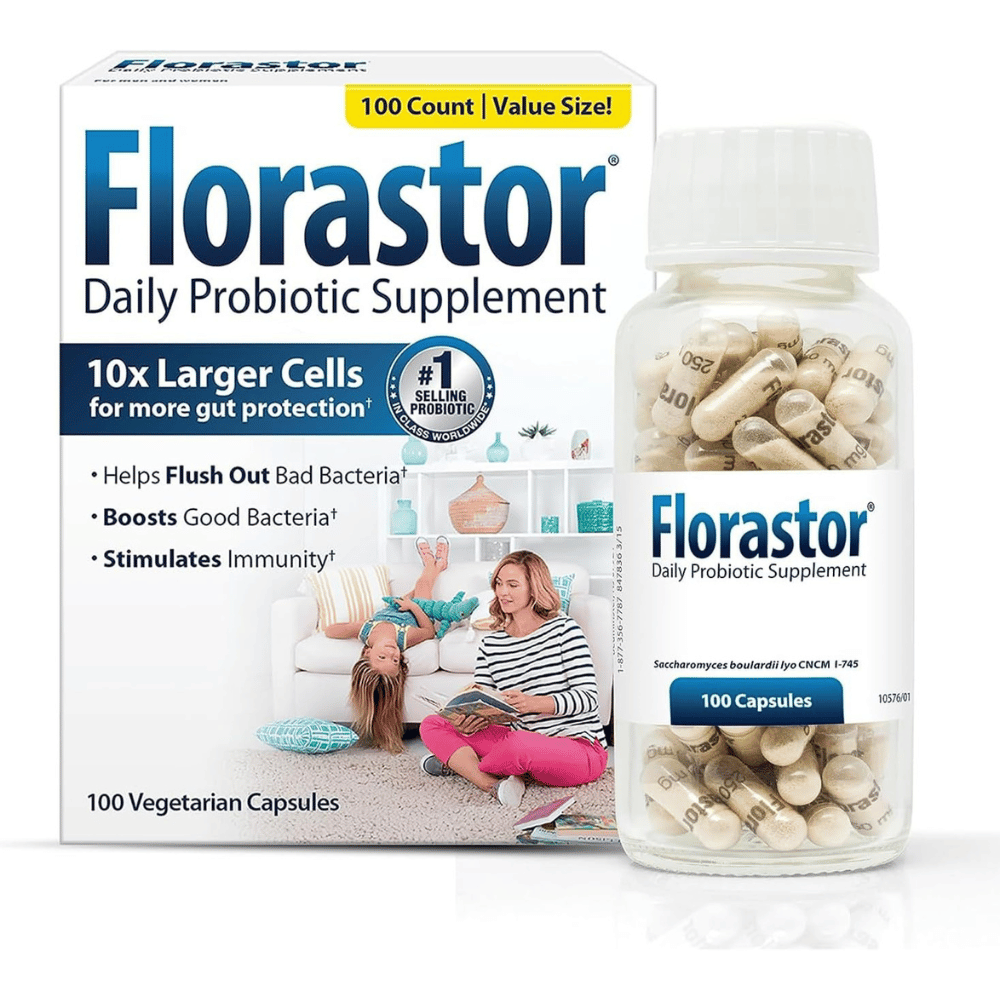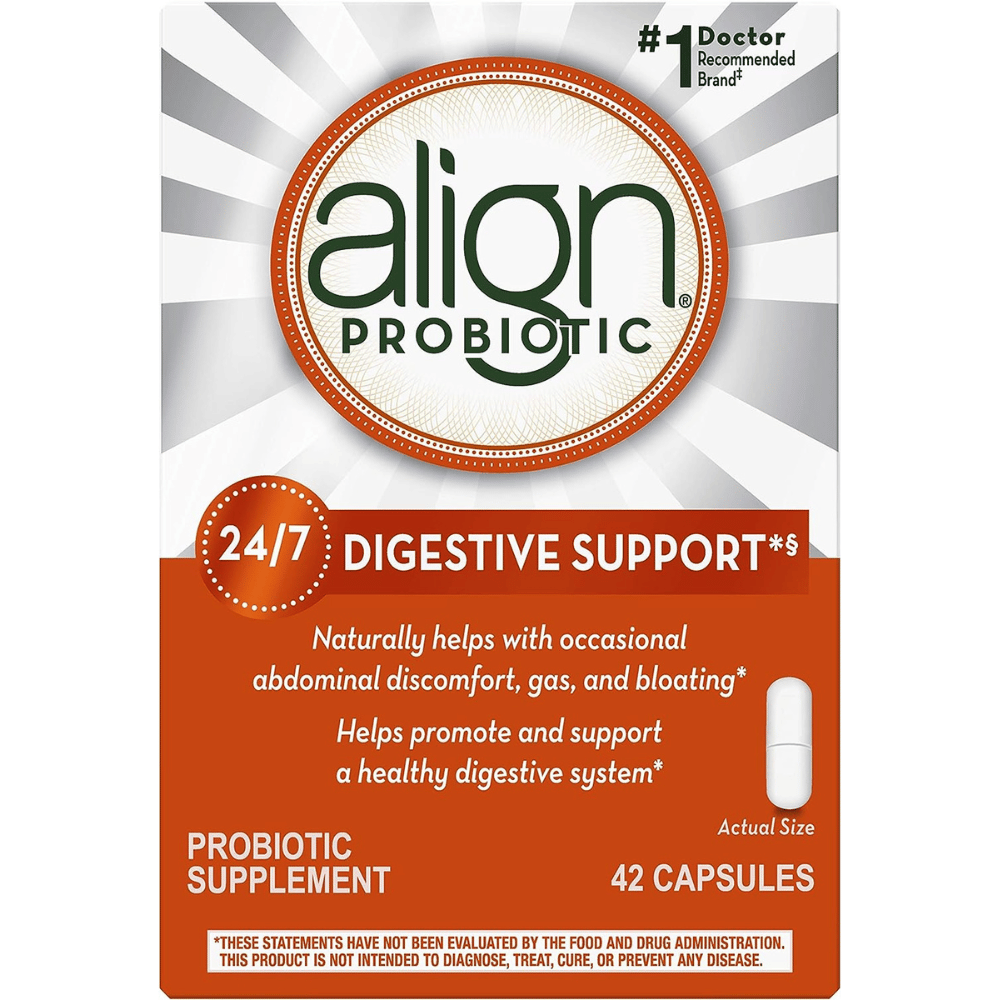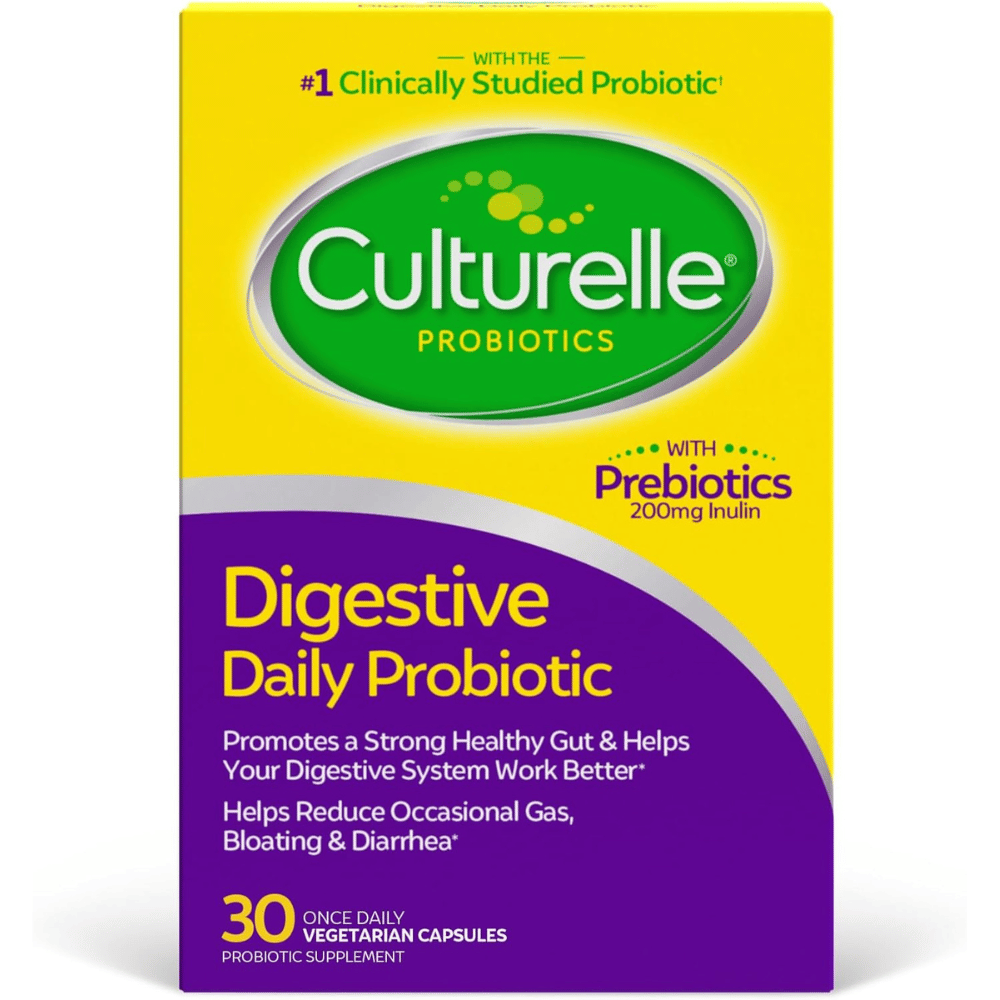Diarrhea can be a distressing and potentially dangerous condition, affecting millions of people worldwide. Whether it's a result of an infection, a side effect of medication, or a chronic issue like irritable bowel syndrome (IBS), finding effective treatments is crucial.
Among the various remedies, probiotics have emerged as a promising solution. This comprehensive review delves into the best probiotics for diarrhea, examining their efficacy, the science behind them, and how they can be integrated into your health regimen.
Key Takeaways:
- Certain probiotic strains have been scientifically proven to reduce the duration and severity of diarrhea.
- Probiotics can be particularly effective for antibiotic-associated diarrhea, acute infectious diarrhea, and diarrhea in children.
- It's essential to choose the right probiotic strains and doses for specific types of diarrhea to achieve the best results.
Understanding Diarrhea and Its Impact on Gut Health
Diarrhea is characterized by loose, watery stools and frequent bowel movements. It can be caused by viral and bacterial infections, contaminated food, or chronic conditions such as inflammatory bowel diseases. The condition can lead to dehydration and nutrient loss, making it crucial to address promptly.
The gut microbiota plays a pivotal role in maintaining digestive health. An unbalanced gut microbiome, often referred to as gut dysbiosis, can lead to digestive symptoms including diarrhea. Probiotics, which are beneficial bacteria, can help restore the balance of gut flora and improve gut health.
The Role of Probiotics in Treating Diarrhea
Probiotics are live microorganisms that, when administered in adequate amounts, confer a health benefit on the host. They work by enhancing the immune system, competing with pathogenic bacteria for nutrients and space in the gut, and producing substances that can inhibit or kill harmful bacteria.
Probiotic treatment for diarrhea aims to replenish the gut with beneficial bacteria, reduce intestinal inflammation, and restore normal bowel movements. By doing so, probiotics can help shorten the duration of diarrhea and alleviate symptoms such as abdominal pain and watery stools.
Efficacy of Probiotics for Acute Diarrhea
Acute diarrhea is typically a short-term condition that can be caused by infections or certain medications. Randomized controlled trials have shown that taking probiotics can be effective in treating acute infectious diarrhoea, reducing the duration of diarrhea and the frequency of watery stools.
Lactobacillus rhamnosus GG and Saccharomyces boulardii are two probiotic strains that have been extensively studied and found to be particularly effective in treating acute diarrhea. These strains can survive stomach acid and reach the gut where they exert their beneficial effects.
Probiotics and Antibiotic-Associated Diarrhea
Antibiotic treatment can disrupt the balance of gut bacteria, leading to antibiotic-associated diarrhea. Probiotic supplementation during and after antibiotic use can help prevent this type of diarrhea by maintaining a healthy gut microbiome.
Several probiotic strains, including Lactobacillus acidophilus and Lactobacillus casei, have been shown to reduce the risk of developing antibiotic-induced diarrhea. It's important to start taking probiotics with the onset of antibiotic treatment and continue for a short period after the treatment ends.
Probiotics for Chronic Diarrhea and IBS
Chronic diarrhea, which persists for several weeks or longer, can be a symptom of underlying conditions such as IBS or inflammatory bowel diseases. Probiotics can help manage chronic diarrhea by improving gut flora and reducing intestinal inflammation.
Specific probiotic strains like Bifidobacterium infantis have been found to alleviate IBS symptoms, including chronic diarrhea. Regular probiotic supplementation can help regulate bowel movements and improve overall digestive health for those with chronic conditions.
Preventative Measure for Traveler's Diarrhea
Traveler's diarrhea is a common ailment that affects millions of globetrotters annually, often caused by ingesting contaminated food or water. Probiotics, specifically diarrhea probiotics, have emerged as a potential preventative measure, offering a shield for the digestive system against pathogenic invaders.
Studies suggest that certain lactobacillus strains, when taken prior to travel, can colonize the gut with good bacteria, creating a hostile environment for harmful microbes. This prophylactic approach is gaining traction as a natural alternative to traditional pharmaceuticals, with travelers increasingly turning to dietary supplements to safeguard their gut health.
The effectiveness of probiotics in preventing traveler's diarrhea hinges on the strains and viability of the bacteria. A regimen starting several days before the journey and continuing throughout the trip can optimize the digestive system's defenses.
While research is ongoing, early indications are promising, with specific strains such as Lactobacillus acidophilus and Bifidobacterium bifidum being highlighted for their protective properties. As more travelers adopt this practice, the incidence of traveler's diarrhea could see a significant decline, making probiotics a staple in travel medicine.
Probiotic Strains Specific to Traveler's Diarrhea
Traveler's diarrhea is a common ailment that affects millions of globetrotters annually, often caused by ingesting contaminated food or water. Probiotic strains such as Saccharomyces boulardii and a combination of Lactobacillus acidophilus and Bifidobacterium bifidum have been identified as particularly effective in preventing and managing this condition. Studies suggest that these strains can reduce the incidence and severity of traveler's diarrhea, likely due to their ability to enhance gut barrier function and inhibit pathogenic bacteria.
Furthermore, the use of probiotics for travelers diarrhea is not only about prevention; it's also about treatment. When symptoms do arise, a timely dose of the right probiotics can help to restore balance to the gut microbiota, alleviate symptoms, and accelerate recovery.
Travelers are advised to begin probiotic therapy a few days before departure and continue throughout their trip to maximize the protective benefits against potential gastrointestinal disruptions.
Probiotic Efficacy in Different Geographic Regions
When considering the use of probiotics for traveler's diarrhea, it is crucial to understand the efficacy of specific strains across different geographic regions. Studies have shown that the prevalence of certain pathogens causing diarrhea can vary significantly from one region to another, which implies that a probiotic effective in one locale may not be as beneficial in another.
For instance, Lactobacillus rhamnosus GG and Saccharomyces boulardii have been widely studied and are known to offer protection against gastrointestinal disturbances in various parts of the world.
Moreover, the local diet and endemic microflora can influence the effectiveness of probiotic strains. Travelers venturing to high-risk areas such as South Asia, Africa, and Latin America might benefit from a tailored probiotic regimen that takes into account the predominant bacterial strains in those regions.
Research is ongoing to identify the most potent probiotic strains for traveler's diarrhea prevention, with an emphasis on broad-spectrum efficacy that can provide relief regardless of the destination.
Strategic Probiotic Use During International Travel
International travel exposes individuals to a variety of environmental changes that can challenge the gut microbiome, increasing the susceptibility to traveler's diarrhea. Strategic use of probiotics before, during, and after travel can help in maintaining gut health and potentially reduce the incidence of diarrhea.
Probiotics such as Lactobacillus acidophilus and Bifidobacterium bifidum have been identified as beneficial for supporting the gut's defense mechanisms against unfamiliar pathogens commonly encountered during travel. By enhancing the gut's barrier function and modulating the immune response, these probiotics can provide a valuable layer of protection for travelers.
It is advisable for travelers to begin probiotic supplementation several days prior to departure and to continue throughout their trip. This preparatory phase allows the probiotics to establish a presence in the gut, creating a more resilient microbiota capable of withstanding the stressors of travel.
Additionally, selecting probiotic formulations with a diverse range of strains may offer broad-spectrum support against the various pathogens that cause traveler's diarrhea. Travelers should seek products with high viability and stability to ensure that the probiotic organisms remain active throughout the duration of their journey.
Addressing Antibiotic-Induced Diarrhea with Probiotic Therapy
Antibiotic-induced diarrhea is a frequent complication arising from the disruption of the gut's microbial balance. Antibiotics, while effective against bacterial infections, often indiscriminately kill good bacteria along with the bad, leading to gastrointestinal distress.
Probiotics have been identified as a beneficial adjunct therapy, with certain lactobacillus strains demonstrating the ability to replenish the gut's beneficial flora and restore equilibrium to the digestive system. By introducing these probiotics during or immediately after antibiotic treatment, patients can significantly reduce the risk and severity of antibiotic-induced diarrhea.
Clinical trials have underscored the importance of strain-specificity and dose in combating antibiotic-induced diarrhea. High-quality, multi-strain probiotics that include Lactobacillus rhamnosus GG and Saccharomyces boulardii have shown particular efficacy.
These dietary supplements work by adhering to the gut lining, crowding out pathogenic bacteria, and promoting the regrowth of the gut's native good bacteria. As awareness of this therapeutic strategy grows, it is becoming a critical component of antibiotic stewardship programs, aiming to minimize the collateral damage to the digestive system and improve patient outcomes.
Probiotics and Inflammatory Bowel Disease (IBD)
Inflammatory Bowel Disease (IBD), encompassing conditions such as Crohn's disease and ulcerative colitis, often leads to chronic diarrhea and a disrupted gut environment. The role of probiotics in managing IBD has been a subject of interest, with many probiotic strains being evaluated for their ability to modulate the immune response and enhance the gut's mucosal barrier function. Lactic acid bacteria, in particular, have been noted for their anti-inflammatory properties, which may prove beneficial in reducing the gastrointestinal symptoms associated with IBD.
The therapeutic potential of probiotics in IBD also extends to maintaining remission and preventing relapses of loose stools and intestinal discomfort. For instance, the probiotic Saccharomyces boulardii has been associated with reduced rates of relapse in patients with Crohn's disease.
However, it is important to note that while some patients may experience relief with probiotics, others may not respond as favorably. Therefore, personalized approaches considering the individual's unique gut microbes and disease state are essential for optimizing probiotic therapy in IBD management.
Probiotics for Diarrhea in Children
Diarrhea in children can be particularly concerning due to the risk of dehydration. Probiotic bacteria, such as Lactobacillus rhamnosus GG, have been shown to effectively treat diarrhea in children, reducing the duration and severity of the condition.
It's essential to choose probiotic supplements that are safe and specifically designed for children. Probiotic doses should be adjusted according to the child's age and the severity of diarrhea symptoms.
The Best Probiotic Strains for Diarrhea
Not all probiotics are created equal when it comes to treating diarrhea. Certain probiotic strains have been identified as more effective for specific types of diarrhea. For example, Lactobacillus rhamnosus GG is one of the best-studied probiotics for acute diarrhea, while Saccharomyces boulardii is recommended for traveler's diarrhea.
When selecting a probiotic supplement, it's crucial to look for products that contain these specific strains in adequate amounts to ensure the best results in treating diarrhea.
Probiotic Doses and Administration
The effectiveness of probiotics also depends on the dose administered. Higher doses of probiotics may be more effective in reducing the duration of diarrhea. It's important to follow the recommended doses of probiotic supplements or seek advice from a healthcare professional.
Probiotics should be taken with or just before a meal to ensure that they survive the acidic environment of the stomach and reach the gut where they can exert their beneficial effects.
The Safety and Side Effects of Probiotics
Probiotics are generally considered safe for most people. However, some individuals may experience mild side effects such as gas or bloating, especially when starting probiotic supplementation. These symptoms usually subside as the body adjusts to the increased levels of beneficial bacteria.
In rare cases, people with compromised immune systems or severe illnesses may be at risk of developing infections from probiotic bacteria. It's always best to consult with a healthcare provider before starting any new supplement, including probiotics.
Probiotics and Diet: A Synergistic Approach
Diet plays a significant role in maintaining a healthy gut microbiome. Consuming a diet rich in fiber, prebiotics, and fermented foods can enhance the effects of probiotic supplements and promote gut health.
Incorporating foods like yogurt, kefir, sauerkraut, and kimchi, which naturally contain probiotics, can support the treatment of diarrhea and contribute to a balanced intestinal flora.
The Future of Probiotic Treatment for Diarrhea
Research on probiotics is continually evolving, with new strains being identified and studied for their health benefits. The future of probiotic treatment for diarrhea looks promising, with the potential for personalized probiotic therapies based on individual gut microbiota profiles.
As our understanding of the gut microbiome grows, so does the potential for targeted probiotic treatments that can effectively address various forms of diarrhea and improve digestive health.
Top 3 Probiotics to Conquer Diarrhea
We've scoured the shelves and online reviews to bring you the top 5 probiotics that are specifically effective for battling diarrhea. Get ready to say goodbye to those bathroom sprints and hello to digestive bliss!
Culturelle is a heavyweight in the probiotic world, and its Digestive Health Probiotic is particularly adept at tackling diarrhea.
Key Benefits:
- Contains Lactobacillus GG: A clinically studied strain proven to help reduce diarrhea.
- Dairy and Gluten-Free: Suitable for those with sensitivities or allergies.
- Comes in Capsules: Easy to take with or without food.
Customer Review:
"After a nasty bout of gastroenteritis, I was dealing with lingering diarrhea until I found Culturelle. It's been a game-changer for my gut health, and I'm back to my normal self!"

Florastor Daily Probiotic Supplement
Made with ingredients that are vegetarian, gluten-free, titanium dioxide-free.
Florastor is a unique probiotic that stands out for its use of the yeast Saccharomyces boulardii lyo CNCM I-745, which is particularly effective against diarrhea.
Key Benefits:
- Yeast-Based Probiotic: Thrives even during antibiotic use, which can cause diarrhea.
- Promotes Intestinal Health: Helps to maintain the balance of good microorganisms.
- Travel-Friendly: Doesn't require refrigeration, making it great for on-the-go.
Customer Review:
"I travel a lot for work, and nothing ruins a trip like traveler's diarrhea. Florastor has been my go-to for prevention, and it's worked wonders. No more travel woes for me!"

Align Probiotic 24/7 Digestive Support
#1 probiotic recommended by Gastroenterologists
Align is another popular choice that's been recommended by gastroenterologists for its effectiveness in managing digestive issues, including diarrhea.
Key Benefits:
- Patented Probiotic Strain: Bifidobacterium 35624, unique to Align.
- Once Daily Capsule: Convenient for those with a busy lifestyle.
- Continuous Support: Designed to work as a daily supplement for long-term gut health.
Customer Review:
"I've had IBS with frequent diarrhea for years, and nothing seemed to help until I tried Align. It's seriously improved my quality of life. I can't imagine going without it now."
When diarrhea disrupts your life, it's important to find a solution that not only provides relief but also addresses the underlying imbalance in your gut. These top 3 probiotics are backed by research and user experiences to help you regain control and comfort. Remember, it's always a good idea to consult with a healthcare professional before starting any new supplement, especially if you have ongoing health concerns.
Summary
Probiotics offer a natural and effective way to treat various types of diarrhea. By understanding the specific strains and doses that are most beneficial for each condition, individuals can harness the power of these beneficial bacteria to improve their gut health and alleviate diarrhea symptoms.
With ongoing research and a growing interest in gut microbiota, the role of probiotics in treating diarrhea is likely to expand, offering hope for those seeking relief from this common ailment.
FAQ Section
Q: Can probiotics cure diarrhea? A: Probiotics can help treat and reduce the duration and severity of diarrhea by restoring the balance of gut bacteria. However, they should be used as part of a comprehensive treatment plan that may include hydration, diet changes, and medication if necessary.
Q: Are there any risks associated with taking probiotics for diarrhea? A: Probiotics are generally safe for most people, but some may experience mild digestive symptoms such as gas or bloating. Individuals with compromised immune systems should consult a healthcare provider before taking probiotics.
Q: How long should I take probiotics to treat diarrhea? A: The duration of probiotic supplementation can vary depending on the type and severity of diarrhea. It's typically recommended to continue taking probiotics for a few days after symptoms have resolved. For chronic conditions, long-term use may be beneficial. Always consult with a healthcare professional for personalized advice.








